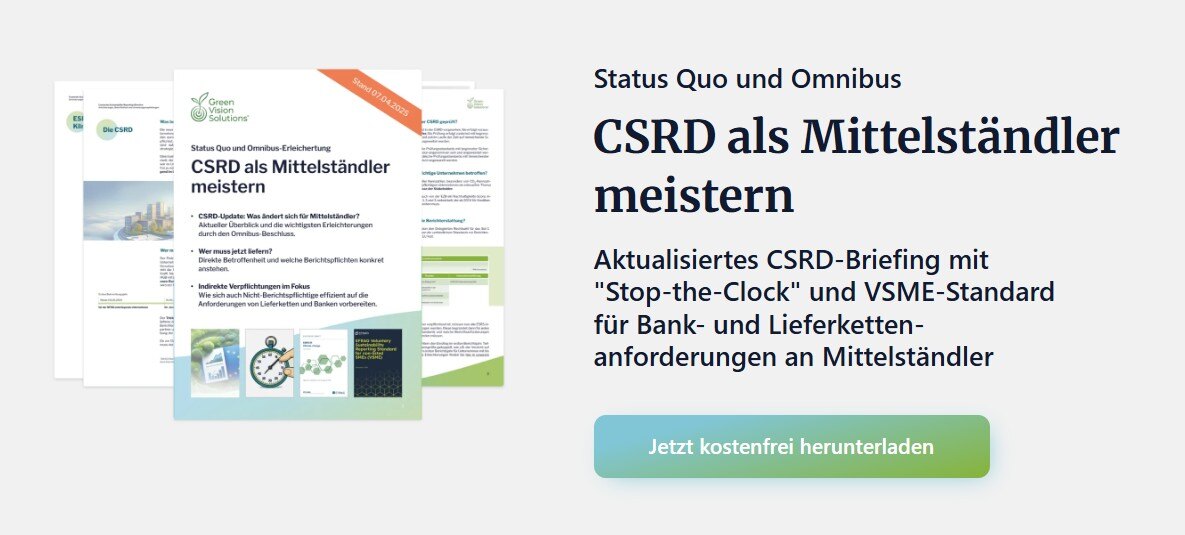More than just software: Your team for carbon accounting
We provide personalized support, a TÜV-certified process, and practical online seminars. → Learn more
| Update: 17. September 2025
🕓 Reading time 6 minutes

Germany's approach to CSRD implementation
The Corporate Sustainability Reporting Directive (CSRD) represents a significant expansion of the existing EU directives on non-financial reporting. For Germany, the implementation of this directive is not only a legal obligation but also an opportunity to raise sustainability standards in the economy. This article discusses how Germany is integrating the CSRD into national law and what impact this will have on the corporate landscape and sustainability reporting.
Details on how CSRD affects companies and the requirements can be found here.
1. Background of the CSRD
The CSRD came into force at EU level on January 5, 2023. Germany and the other EU member states were required to transpose the Corporate Sustainability Reporting Directive (CSRD) into national law within 18 months of its entry into force at EU level. As the CSRD came into force on January 5, 2023, it should have been transposed into German law by July 2024 at the latest. The first draft bill on the CSRD Implementation Act was presented in 2024, followed by a second, updated draft on July 10, 2025.
2. What is the current status of the legal implementation of the CSRD in Germany?
The implementation of the CSRD into German law has not been completed by the end of 2024. The CSRD Implementation Act must therefore be passed in 2025 and will only then enter into force.
Since the law implementing the CSRD in Germany was not passed in 2024, companies subject to the NFDR must, as before, prepare their report for 2024 only according to the NFRD. new standards (ESRS) are for 2024, contrary to plan, not yet mandatory – they could voluntarily The Institute of Public Auditors in Germany (IDW) reports that these rules will be used. For "large" companies that report for the first time in 2025, nothing is expected to change.
Germany has committed to seamlessly integrating the CSRD into its existing corporate reporting system. This means adapting the German Commercial Code (HGB) and other relevant laws to reflect the CSRD requirements. These adjustments include detailed rules on the disclosure of information on environmental, social, and governance (ESG) aspects. The use of reporting standards such as the ESRS (European Sustainability Reporting Standards) is crucial to ensure consistent and transparent sustainability reporting.
On March 22, 2024, the Federal Ministry of Justice presented the eagerly awaited first draft of a bill to implement the CSRD in Germany. This includes amendments to the German Commercial Code (HGB) to incorporate the CSRD requirements. This so-called CSRD Implementation Act is not intended to transpose any further measures beyond the CSRD into national law.
On July 24, 2024, the German Federal Cabinet adopted the draft CSRD Implementation Act, which transposes EU Directive 2022/2464 into German law with virtually no changes. Although the deadline for implementing the directive expired on July 6, 2024, Germany – like other EU states – has failed to meet it.
On July 10, 2025, a new draft bill (document available here) was published on July 10, 2025. The government draft (RegE) has been available since September 3, 2025. This also takes into account the changes that have been decided in the meantime by the Omnibus Proposal, such as the stop-the-clock postponement of the reporting obligation. Final implementation is still pending and is expected to take place in 2025.
3. What are the general differences between the EU directive and national law?
The main difference between an EU directive, such as the Corporate Sustainability Reporting Directive (CSRD), and the implemented national law lies in their legal nature and application. The EU directive sets targets and requirements at the European level and provides member states with a framework that they must transpose into national law. The CSRD, for example, lays the foundations for expanded and detailed requirements for corporate sustainability reporting. In the German implementation, these European requirements must now be transformed into specific national laws and regulations. This also includes conducting a materiality analysis to identify the most relevant sustainability issues for each company.
EU Directive (CSRD)
An EU directive sets objectives and requirements at the European level. It provides member states with a framework that they must implement into national law. The CSRD, for example, lays down the foundations for expanded and detailed requirements for corporate sustainability reporting.
Directives allow member states a certain degree of flexibility in implementation to take local specificities into account. States can decide how best to achieve the objectives of the directive within their own legal context.
An EU directive is not directly applicable in the member states. It must first be implemented into national law to become legally binding.
Transformed national law
The implementation of an EU directive into national law takes place through the adoption of laws, regulations, or other legal instruments at the national level. These laws specify the provisions of the directive and integrate them into the existing national legal system.
Unlike the EU Directive, the national laws and regulations resulting from its implementation are directly applicable in the respective country. Companies and individuals must comply with these national regulations.
Implementation may take into account specific national needs and characteristics that may not be addressed in detail in the EU Directive. This may lead to differences in the implementation of the CSRD between different EU Member States.
VSME & Omnibus simplifications
Current simplifications and carbon accounting for CSRD or supply chain inquiries
19. Nov., 10.30-11.15 Uhr
4. What exactly does the CSRD Implementation Act contain?
Important contents of the CSRD Implementation Act are:
- Integration of CSRD requirements: For companies falling within the scope of the CSRD, regulations in the German Commercial Code regarding financial reporting, particularly regarding management reports and audits, will be amended. The law will expand management reports to include a mandatory sustainability report (covering environmental, social, and human rights aspects, as well as governance factors), which will be audited with limited assurance.
- Professional regulations for auditors: The regulations will be adapted to the requirements for the review of sustainability reports by auditors, for example with regard to training and continuing education requirements.
- Audit by the auditing body of a public limited company: The audit committee of a public limited company must ensure and verify that sustainability reporting is carried out correctly.
In summary, the CSRD, as an EU directive, creates a common framework for sustainability reporting in the EU, while its implementation into national law in Germany by June 2024 will include specific regulations that are directly applicable in Germany.
The CSRD Implementation Act contains amendments to the German Commercial Code (HGB) to integrate the requirements of the Corporate Sustainability Reporting Directive (CSRD). The Act aims to transpose only the requirements of the CSRD into German law without introducing any additional measures beyond those required by the Directive.
For companies, this means taking a close look at ESG and carbon footprint issues and conducting a comprehensive materiality analysis to ensure that their reporting complies with the new standards.

Get started with CO₂ accounting successfully!
Drawing on our practical experience, our team at Green Vision Solutions has developed a clear and TÜV-certified process for assessing your CO₂ footprint – and has already successfully applied it to over 200 companies.
With a permanent project sponsor and intuitive data entry software, we will also collect Scope 1, 2 and 3 data together with you – guaranteed to be easy and without any prior knowledge required on your part!
Find out more here
Sources
KPMG – Neuer Referentenentwurf zum CSRD-Umsetzungsgesetz veröffentlicht: https://kpmg.com/de/de/home/themen/2025/07/neuer-csrd-referentenentwurf-veroeffentlicht.html Accessed on August 5, 2025
Grant Thornton – CSRD-Umsetzungsgesetz: Neuer Referentenentwurf zur Nachhaltigkeitsberichterstattung liegt vor: https://www.grantthornton.de/themen/2025/csrd-umsetzungsgesetz-neuer-referentenentwurf-zur-nachhaltigkeitsberichterstattung-liegt-vor Accessed on August 5, 2025
Rödl & Partner – Bundesregierung veröffentlicht neuen Referentenentwurf zur CSRD-Implementierung: https://www.roedl.de/themen/esg-news/breaking-news/csrd-umsetzung-bundesregierung-veroeffentlicht-neuen-referentenentwurf Accessed on August 5, 2025
The National Law Review – Update on Germany’s Transposition of the CSRD: https://natlawreview.com/article/update-germanys-transposition-csrd Accessed on August 5, 2025
Subscribe to our free climate news (de) and never miss any industry news or articles!
Topics
Latest post
Omnibus Regulation: Far-reaching simplifications for the CSRD
Mehr als nur Software: Ihr Team für CO₂-BilanzenWir begleiten mit persönlicher Beratung, einem TÜV-zertifizierten Prozess und praxisnahen...
Introduction to the CO₂ balance
Calculate your CO2 footprint: This is the data companies need for their carbon footprint
Mehr als nur Software: Ihr Team für CO₂-BilanzenWir begleiten mit persönlicher Beratung, einem TÜV-zertifizierten Prozess und praxisnahen...
Regulatory frameworks
Omnibus Regulation: Far-reaching simplifications for the CSRD
Mehr als nur Software: Ihr Team für CO₂-BilanzenWir begleiten mit persönlicher Beratung, einem TÜV-zertifizierten Prozess und praxisnahen...
Entdecken Sie unsere Seminare & mehr
Find practical training courses on all aspects of greenhouse gas reporting

3.–5.11. | 3 Tage | Online-Seminar
Calculation of the greenhouse gas balance via Scope 1-3
Learn how to calculate GHG emissions yourself - with methods, sources for emission factors and practical relevance

Mi 10.12. | 4 h | Online-Seminar
Materiality analysis and data preparation for CO₂ reporting
Avoid errors and additional effort: Which Scope 1 to 3 data are actually relevant according to GHG?

Do 15.01. | 3 h | Online-Seminar
Scope 3 Data Dilemma
Between data gaps and mountains of data: Coping with GHG in practice



